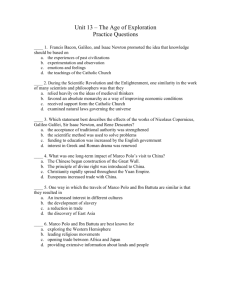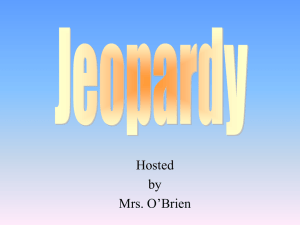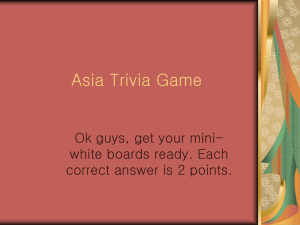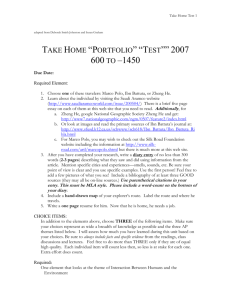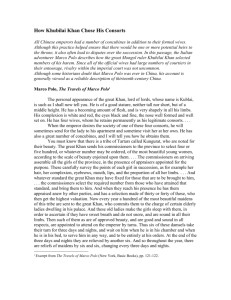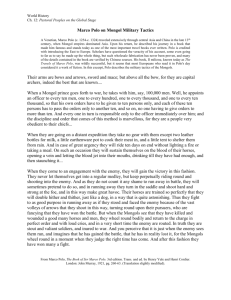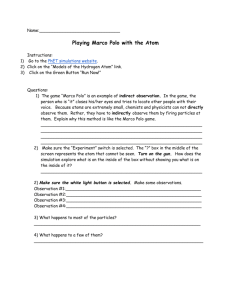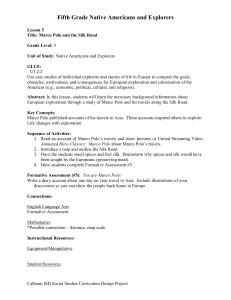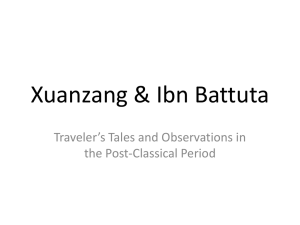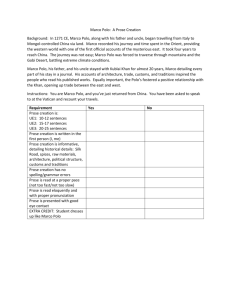Unit 8 - National Geographic Learning
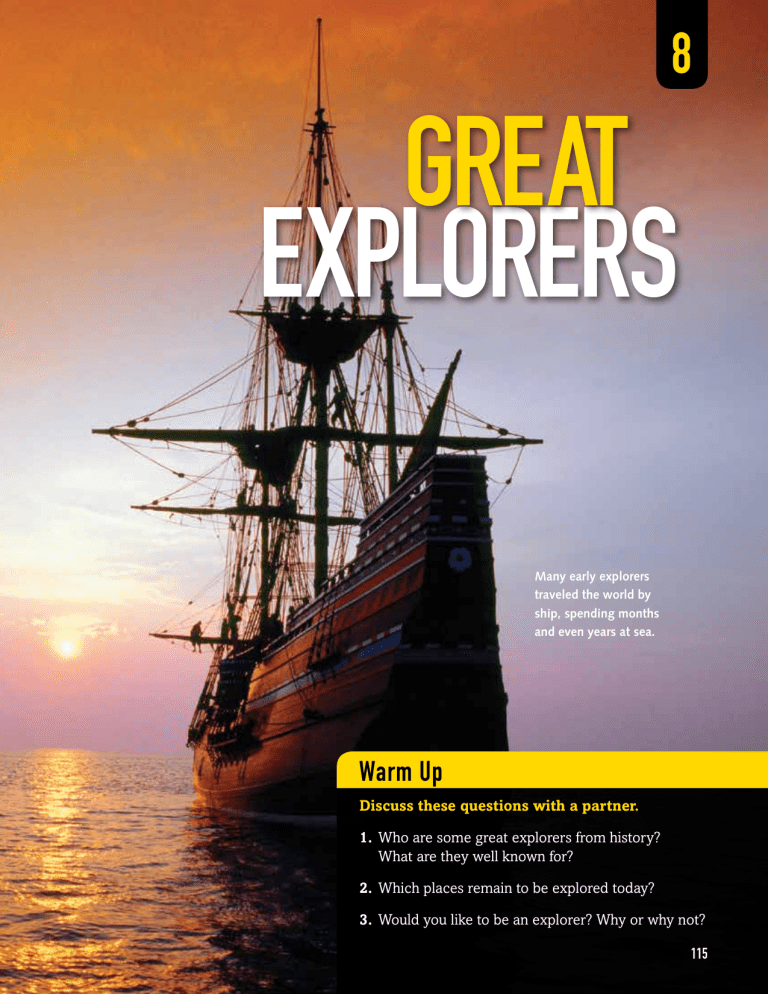
8
Many early explorers traveled the world by ship, spending months and even years at sea.
Warm Up
Discuss these questions with a partner.
1. Who are some great explorers from history?
What are they well known for?
2. Which places remain to be explored today?
3. Would you like to be an explorer? Why or why not?
115
8A
Before You Read
A. Reading Maps. Look at the map of the explorer Marco
Polo’s journey. Then answer the questions.
1. Where did Marco Polo start and finish his trip? For how many years did he travel?
2. What were some of the furthest places he reached during his travels?
3. What other places did he visit? What do you know about these places?
B. Predict. Why do you think Marco Polo went on such a long journey? Read the passage to check your ideas.
116 Unit 8A
Route map of Marco Polo’s journey
1
5
10
MARco Polo
in
chinA
The Polos—Marco, his father Niccolò, and his uncle
Maffeo—had been traveling for three and a half years when they finally achieved their objective —a long-awaited meeting with the powerful Mongol leader, Kublai Khan. The historic event took place in 1275 at the Khan’s luxurious summer capital 1 in Shengdu, in what is now northern China.
Kublai Khan was surprisingly informal as he greeted his tired guests: “Welcome, gentlemen! Please stand up. How’ve you been? How was the trip?”
Marco Polo’s trip had, in fact, started more than 9,000 kilometers (5,600 miles) away in Venice when he was just
In Marco Polo’s journal, he writes of the great cities of China, filled with grand buildings and palaces, like nothing he had ever seen before.
1 The capital of a country is the city where its government meets.
Unit 8A 117
“Through [this great city] runs a large river . . . The number of boats on this river is so great that no one who should read or hear the tale would believe it .
. . In fact, it is so big that it seems to be a sea rather than a river!”
–Marco Polo
15
20
25 a teenager. His father and uncle already knew Kublai Khan from a previous visit five years earlier, when they had spent a short time in
Shengdu. On this second trip, the Polos stayed for 17 years before they returned home. They made themselves useful to the Khan and undertook various missions 2 and tasks for him. It is likely that the
Khan considered it an honor 3 that these Europeans—who were rare in China—had made this extremely difficult journey, and he took the opportunity to make good use of their skills and knowledge.
While he was in the service of Kublai Khan, “the most powerful man in people and in lands and in treasure that ever was in the world,”
Marco Polo was able to learn and experience many things that were new to Europeans. In his travel journal , he wrote that Kublai
Khan’s palace was the greatest he had ever seen. He admired the
Khan’s recently completed new capital, Daidu, whose streets were
“so straight and so broad.” The city was located in what is now the center of Beijing, and Kublai Khan’s city planning can still be perceived in the straight, broad streets of China’s modern capital.
118 Unit 8A
2 A mission is an important task, especially one that involves traveling.
3 Something that is an honor is special and desirable.
30
35
40
45
We learn from Marco Polo that, in the administration of his empire, Kublai Khan made use of a fast and simple message system.
Horse riders spaced every 40 kilometers allowed messages to cover
500 kilometers a day. As soon as one horse had run 40 kilometers, the next horse would run the next 40 kilometers, and so on. Marco also learned the secret of asbestos cloth, which is made from a mineral and doesn’t catch fire. Paper money also took him by surprise, since it was not yet in use in the West at that time. Homes were heated with “black stones . . . which burn like logs.” Those stones were coal—unknown in most of Europe—and were so plentiful that many people had a hot bath three times a week.
Although the Khan did not want his visitors to leave, the Polos finally received permission to return home in 1292. Marco continued his observations while on the ocean voyage by way of Sumatra and India. After he returned home, Marco completed a book about his trip, full of details about his amazing cultural experiences. It was probably the single greatest contribution to geographical knowledge ever made to the West about the East.
Marco Polo wrote that he saw 15,000 boats a day sailing on the nearby Yangtze River.
The river is famous for its beauty, trade, and influence on art and culture. Today, the lights of boats shine on the Qinhuaihe, a branch of the Yangtze
River flowing through the city of Nanjing.
Unit 8A 119
Reading comprehension
Multiple Choice. Choose the best answer for each question.
Gist
Detail
Detail
1. What is the passage mainly about?
a. Marco Polo’s relationship with Kublai Khan b. why Marco Polo’s travels are important c. why Marco Polo decided to write a book d. how Marco Polo was able to reach China
2. What was surprising about the Polos’ meeting with the Khan?
a. He could speak English.
b. He spoke to them informally.
c. He lived in a luxurious palace.
d. He didn’t remember them from a previous visit.
3. The phrase considered it an honor in line 17 is closest to _____.
a. was angry c. felt respected b. thought it was strange d. thought it was useful
Detail
Inference
4. Kublai Khan used ______ to deliver messages to his people.
a. runners c. horse riders b. the Polos d. birds
5. Marco Polo saw that asbestos cloth, paper money, and coal were used in the East. According to the passage, this shows that _______.
a. the West already knew about and used these inventions b. the East had learned various technologies from the West c. the West had forgotten the technologies used in the East d. the East was ahead of the West in some areas of technology
Sequence 6. What did Marco Polo do after he left China but before he returned to Venice?
a. He wrote a book.
b. He crossed Asia by land.
c. He visited India and Sumatra.
d. He undertook a mission for Kublai Khan.
Reference 7. In line 45, the word It refers to _______.
a. culture c. completion b. the book d. his contribution
Did You Know?
Some people believe
Marco Polo introduced pasta to Europe from
China. He does mention
“macaroni or other sorts of pasta” in his journal.
However, Europeans had probably known about these foods for many years.
120 Unit 8A
Reading Skill
Understanding Time Clauses/
Time Relationships
In addition to before and after , we can also indicate time relationships with when , as soon as , as , and while . These words can begin a sentence (with a comma following the clause), or be used in the middle of a sentence.
The word when can be used when one action happens after another action, or during the same period of time.
Example 1: When I decided to take a trip to China, I told my parents.
Example 2: When he was six, he moved to another city.
Use as soon as when one action happens immediately after another action.
Example: As soon as I landed in Beijing, I texted my parents.
Use while and as when two actions happen at the same time.
Example 1: I felt very excited as the taxi arrived at my hotel.
Example 2: I made a lot of new friends while I was in China.
A. Noticing. Find and underline the words before, after, when, as soon as, as, and while in the passage on pages 117–119.
B. Sequencing. For each pair of actions, mark them 1 (happened first) or 2
(happened second). If both actions happened at the same time, mark both 1.
1. ________ Marco Polo met Kublai Khan.
________ Marco Polo traveled for three and a half years.
2. ________ Marco Polo’s trip started.
________ Marco Polo became a teenager.
3. ________ Marco Polo was in the service of Kublai Khan.
________ Marco Polo was able to learn and experience many new things.
4. ________ Marco Polo was on an ocean voyage.
________ Marco Polo continued his observations.
5. ________ Marco Polo returned home.
________ Marco Polo completed a book.
Critical Thinking Discuss with a partner. Who do you think gained more from the Polos’ visit to China—Marco Polo or Kublai Khan? Why?
Marco Polo
Unit 8A 121
Vocabulary Practice
A. Definitions. Complete the definitions using the correct words from the box.
administration admire informal mineral objective undertake
1. Your _______________ is what you are trying to achieve.
2. If you _______________ someone, you like and respect him or her.
3. A(n) _____________ is a solid, naturally occurring substance.
4. When you _______________ a task or job, you start doing it.
5. The _______________ of a country is conducted by its government.
6. If a situation is _______________, it is usually relaxed, friendly, or unofficial.
B. Completion. Choose the correct words to complete the information below.
After surviving the dangers of the ocean 1.
( voyage / mineral ) from
China, Marco Polo reached his home city of Venice. But more troubles waited for him there. Italy at that time was not united under one government, and the 2.
( administration / admiration ) of each city was left to different powerful families. So the different cities were often at war with each other. During fighting between Venice and Genoa, Marco
Polo was put in prison. There, he met Rustichello, a writer of fairy tales, who 3.
( undertook / contributed ) to Polo’s future fame by helping him create a(n) 4.
( journal / objective ) of his travels. Because of this book, many people around the world 5.
( perceive / admire ) Polo’s achievements as an explorer. Today, Marco Polo is 6 . ( perceived / contributed ) by many to be one of the greatest explorers that ever lived.
Word Partnership
Use undertake with: (v.) undertake
an action, undertake a project, undertake a task.
Marco Polo completed his journal for “all people who wish to know . . . the different regions of the world.”
122 Unit 8A
8B
Istanbul
Tangier
Baghdad Kabul
Delhi
Mecca
Timbuktu
Djénné
Islamic Lands,
14th Century
Route from Tangier to China
Return route
Round trip in Sahara
Before You Read
Adam’s Peak
Sumatra
Mombasa
The travels of Ibn Battuta,
1325–1354
the tRAVelS of iBn BAttUtA
A. Reading Maps. Ibn Battuta was born in Tangier, in what is now Morocco. He was a great explorer, and traveled to many places around the world during the 14th century. Look at the map of his travels and try to guess the answers to these questions.
1. Which person traveled further, Ibn Battuta or Marco Polo?
2. How many places did Ibn Battuta visit?
3. For how many years was Ibn Battuta traveling?
B. Scan. Now quickly read the first two paragraphs on page 124 to check your guesses.
Unit 8B 123
Hangzhou
During 30 years of travel, Ibn
Battuta visited the furthest edges of the Islamic world—from the deserts of North Africa to China and back.
1
5
10
15
the long Journey
“I left Tangier, my birthplace, the 13th of June, 1325, with the intention of making the pilgrimage 1 [to Mecca]. . . . to leave all my friends both female and male, to abandon my home as birds abandon their nests.” So begins an old manuscript 2 in a library in Paris, the travel journal of Ibn Battuta.
Almost two centuries before Columbus, this young Moroccan set off for
Mecca. Returning home three decades later, he is now regarded as one of history’s great travelers. Driven by curiosity, he journeyed to remote corners of the Islamic world, traveling three times as far as Marco Polo, through 44 modern countries. Though little celebrated in the West, his name is well known among Arabs. In his hometown of Tangier, a square, a hotel, a café, a ferry boat, and even a hamburger are named after him.
Prior to his adventures traveling the world, Ibn Battuta studied in Mecca for several years. However, the urge to travel soon took over. He traveled to India, seeking profitable employment with the Sultan 3 of Delhi. On the way, he described his group being attacked in the open country by 80 foot soldiers and two horsemen: “we fought . . . killing one of their horsemen
1 A pilgrimage is a trip to a place of religious importance.
2 A manuscript is a piece of writing that is handwritten, or an early version of a book.
3 A sultan is a ruler in some Islamic countries.
124 Unit 8B
After his great journey, Ibn Battuta
(center) returned home. He died in 1369 at the age of 64 near the town of Fez. The location of his burial site remains a mystery.
20
25
30
35 and about twelve of the foot soldiers. . . . I was hit by an arrow and my horse by another, but God in his grace preserved me. . . . We carried the heads of the slain 4 to the castle of Abu Bak’har . . . and suspended 5 them from the wall.”
In Delhi, the sultan gave him the position of judge, based on his studies at Mecca. But the sultan had an unpredictable character, and Ibn Battuta was soon looking for an opportunity to leave. When the sultan offered to finance a trip to China, Ibn Battuta agreed. He set off in three ships, but misfortune struck while he was still on shore. A sudden storm grounded and broke up two ships. Scattering 6 treasure, the storm drowned many people and horses. As he watched, the third ship, with all his belongings and slaves—one carrying his child—was carried out to sea and never heard from again.
After a lifetime of incredible adventures, Ibn Battuta was finally ordered by the Sultan of Morocco to return home to share his wisdom with the world. Fortunately, he consented and wrote a book that has been translated into numerous languages, allowing people everywhere to read about his unparalleled journeys.
4 Someone who has been slain has been killed.
5 If you suspend something from a high place, you hang it from that place.
6 If things are scattered , they have been thrown or dropped so they are spread all over an area.
Unit 8B 125
Reading comprehension
Multiple Choice. Choose the best answer for each question.
Gist
Detail
1. What is the passage mainly about?
a. Ibn Battuta’s visit to Mecca b. Ibn Battuta’s character c. the adventures of Ibn Battuta d. the books that Ibn Battuta wrote
2. Why did Ibn Battuta first leave Tangier?
a. to teach c. to visit Mecca b. to help his family d. to look for a job abroad
Vocabulary 3. Which of the following is closest in meaning to the phrase set off for in line 6?
a. arrived at c. left to go to b. discussed d. decided upon
Detail 4. The Sultan of Delhi gave Ibn Battuta the position of judge because __________.
a. the sultan needed a translator b. Ibn Battuta had studied in Mecca c. Ibn Battuta had been a judge before d. Ibn Battuta had traveled to many countries
Reference 5. What does the word one refer to in line 29?
a. a ship c. a slave b. a storm d. a mother
Detail
Inference
6. Why did Ibn Battuta finally return home?
a. He was tired of traveling.
b. He feared the Sultan of Delhi.
c. He didn’t have any more money.
d. The Sultan of Morocco asked him to return.
7. The writer of this passage most likely thinks that
Ibn Battuta’s journey _______.
a. didn’t really happen b. was inspired by Marco Polo’s travels c. was common for people of that time d. should be more well known in the West today
Did You Know?
In Dubai, there is a large shopping mall named after Ibn Battuta. It has six sections named after areas of the world he visited.
126 Unit 8B
Reading Skill
Recognizing Participle Clauses
Participle clauses are very common in written English. They show relationships between two or more actions. Recognizing them will help you understand how one action is related to another action.
Participle clauses can use the present participle (ing ) or past participle
(ed ). When the sentence shows one subject performing two different actions, use the ing form for the first verb.
Example: She stared at the map. She looked for a bus stop. = Staring at the map, she looked for a bus stop.
You should use the ed form when one action is in the passive voice.
Example: The residents were rescued by the firefighters. They all survived the fire. = Rescued by the firefighters, the residents all survived the fire.
A. Analyzing. These sentences are from the reading on pages 124–125.
Choose the correct participle to complete each sentence. Then check your answers in the reading.
1. (Returning / Returned) home three decades later, he is now regarded as one of history’s great travelers. (paragraph 2)
2. (Driving / Driven) by curiosity, he journeyed to remote corners of the
Islamic world . . . (paragraph 2)
3. Though little (celebrating / celebrated) in the West, his name is well known among Arabs. (paragraph 2)
4. He traveled to India, (seeking / seeked) profitable employment with the Sultan of Delhi. (paragraph 3)
5. (Scattering / Scattered) treasure, the storm drowned many people and horses. (paragraph 4)
B. Combining. Combine the two sentences into one. Make the first sentence a participle clause.
1. Ibn Battuta left his friends behind. Ibn Battuta started traveling in 1325.
____________________________________________________________
2. Ibn Battuta’s book is known as Rihla. His book details his travels in Asia and Africa. __________________________________________________
Critical Thinking Discuss with a partner. How were the travels of
Marco Polo and Ibn Batutta different? How were they similar?
Unit 8B 127
Vocabulary Practice
A. Definitions. Read the information below. Then complete the definitions using the words in red .
During his travels, Ibn Battuta suffered many misfortunes . Here’s one:
In his final journey, he traveled to the remote land of Mali, with the intention of meeting a king who gave his visitors wonderful gifts. Said to be unparalleled , these gifts often included large amounts of gold.
However, prior to Ibn Battuta’s arrival, the old king died. The new king,
Mansa Sulayman, only gave Ibn Battuta a little food. When he saw his gift, Ibn Battuta could only laugh.
1. An area that is ___________ is far away and difficult to get to.
2. If you have the ___________ of doing something, you have decided to do it.
3. A person’s ___________ are bad or unlucky things that happen to them.
4. If something happens ___________ to another thing, it happens before it.
5. If you describe something as ___________, you are emphasizing that it is bigger, better, or worse than anything else of its kind.
B. Completion. Complete the sentences below with the words in the box.
abandoned consented financed translators wisdom
1. Thanks to the work of many ________________, the writings of Ibn Battuta can be read in all major languages.
2. The king and queen of Spain ________________
Christopher Columbus’s voyage to the New World.
3. Kublai Khan finally ________________ to the Polos’ request to return to Europe.
4. A good king is one who has great ____________ and makes good decisions for his people.
5. Urban explorers explore places within a city, including buildings that have been ____________ and now lie empty.
Thesaurus remote Also look up:
(adj.) faraway, distant
128 Unit 8B
The king of Mali,
Mansa Sulayman
VIEWING
The Legend of
Marco Polo
Before You Watch
A. Definitions. Here are some words you will hear in the video. Match the words to their definitions.
1. formidable
2. banquet
•
•
• a. an area within a country
• b. to remove earth carefully to find buried objects
3. excavate •
4. province •
• c. a large, grand meal, usually for many people
• d. inspiring fear or respect by being large or powerful
While You Watch
A. Completion. Many people believe Marco Polo visited China, but others argue that he didn’t. As you watch, choose the correct words from the video to complete the chart.
The Polos leave Venice for their travels to the Far East.
The drawing also shows the strange lands they visited.
Arguments against Polo visiting China Arguments for Polo visiting China
There are factual 1.
(statements / inaccuracies ) in Polo’s book, such as saying a 2.
(battle / wedding) took place in the wrong year.
There are details in his book that couldn’t have been 5.
(invented / believed ) in Europe, such as Polo seeing
6.
(camels / coal) for the first time.
The book describes things that are not possible, such as a 3.
(tiger / fish) that is a hundred feet long with
4.
(feathers / fur) on it.
Polo described a hall big enough for
7.
(6,000 / 10,000) people. When the city was excavated, the placement and style of the 8.
(buildings / streets) were exactly as Polo had described them.
Viewing 129
After You Watch
A. Correction. The captions below are not accurate. Use the information in the video to correct each caption.
1. When Marco Polo wrote his book, he was in jail in China.
___________________________________
___________________________________
2. Marco Polo set off for China from Venice in 1271 a.d., traveling as a geographer.
___________________________________
___________________________________
3. The Chinese call the Taklamakan Desert the “desert of summer.”
___________________________________
___________________________________
4. Marco Polo claims he went to Shengdu, to Kublai Khan’s spring palace.
___________________________________
___________________________________
B. Discuss. Discuss these questions with a partner.
1. Which arguments do you think are stronger—that Marco Polo did or didn’t visit China?
2. Is there information in this video that supports or doesn’t agree with the reading on pages 117–119? If so, which do you think is more convincing?
130 Viewing
